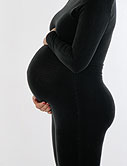- Could Your Grocery Store Meat Be Causing Recurring UTIs?
- Are You Making This Expensive Thermostat Error This Winter?
- Recognizing the Signs of Hypothyroidism
- 10 Strategies to Overcome Insomnia
- Could Artificial Sweeteners Be Aging the Brain Faster?
- Techniques for Soothing Your Nervous System
- Does the Water in Your House Smell Funny? Here’s Why
- Can a Daily Dose of Apple Cider Vinegar Actually Aid Weight Loss?
- 6 Health Beverages That Can Actually Spike Your Blood Sugar
- Treatment Options for Social Anxiety Disorder
Clues to How Heavy Drinking in Pregnancy Harms Child’s Brain


When a woman drinks heavily during pregnancy, the harmful effects on her child’s brain development appear to continue over time, a new study indicates.
The findings point to a possible reason for the persistent attention and behavior problems experienced by children with fetal alcohol spectrum disorders, the researchers noted.
The investigators used functional MRI to monitor the brain activity of children with and without fetal alcohol spectrum disorders over two years. The results showed that children with the disorder had weaker brain activation while doing certain mental tasks than those without the disorder.
“We found that there were significant differences in development brain activation over time between the two groups, even though they did not differ in task performance,” study senior author Elizabeth Sowell, director of the Developmental Cognitive Neuroimaging Laboratory at the Saban Research Institute, Children’s Hospital Los Angeles, said in a hospital news release.
“While the healthy control group showed an increase in signal intensity over time, the children with [fetal alcohol spectrum disorders] showed a decrease in brain activation during visuo-spatial attention,” she explained.
Visuo-spatial attention refers to how you visually perceive the spatial relationships among objects in your environment.
The study was published Aug. 4 in the journal Cerebral Cortex.
The findings show that drinking during pregnancy can change how a child’s brain signaling develops during childhood and the teen years, long after being exposed to alcohol in the womb, the researchers said.
The investigators added that the reduced brain activation in children with fetal alcohol spectrum disorders could explain why they have persistent attention and behavioral problems as they mature.
More information
The U.S. National Library of Medicine has more about fetal alcohol spectrum disorders.
Source: HealthDay
Copyright © 2026 HealthDay. All rights reserved.










